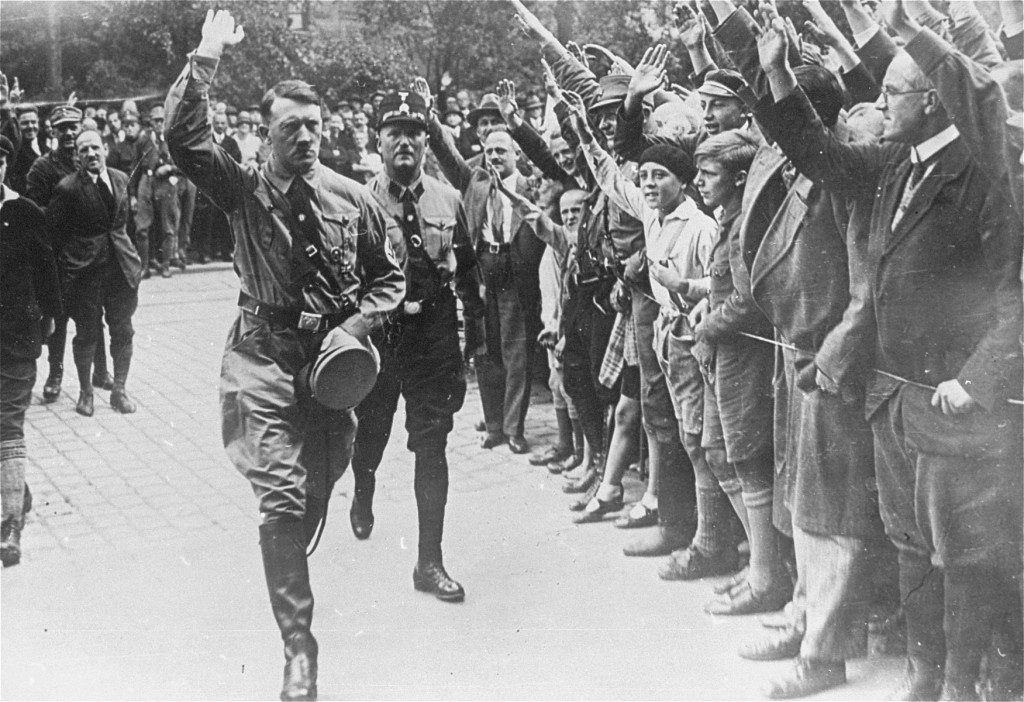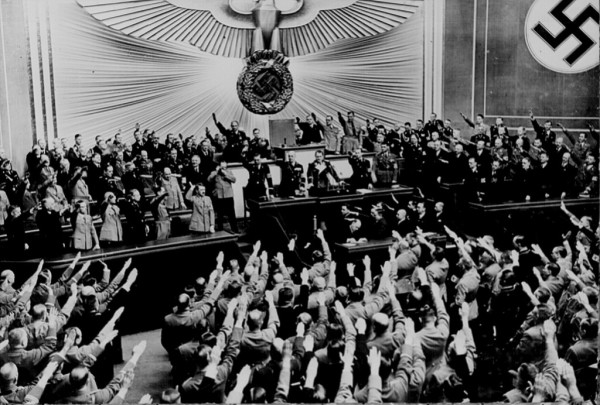How Did Fascist Philosophies Contribute to the Holocaust
Fascism has also been connected to the ideals of Plato though there are key differences between the twoFascism styled itself as the ideological successor to Rome. Fascism is a far-right political philosophy or theory of government that emerged in the early twentieth century.

Fascism Holocaust Encyclopedia
Even those who were anti-Semitic were hesitant if not embarrassed to express it.

. Select the best answer from the choices provided. While fascist movements could be found in almost every country following World War I fascism was most successful in Italy and Germany. Collaboration Complicity in the Holocaust.
Indeed fascism was neither a 20th-century creation nor a peculiarly Italian or German one. The inherently expansionist militaristic nature of Fascism contributed to imperialistic adventures in Ethiopia and the Balkans and ultimately to World War II. Fascists took inspiration from sources as ancient as the Spartans for their focus on racial purity and their emphasis on rule by an elite minority.
Introduce the Concept of Propaganda. The Hitler Youth programme was set up in 1922 with the aim of educating the youth of Germany in Nazi beliefs and physically preparing them for their future as the master race. Incorporate territories with ethnic German populations into the Reich.
An exhaustive evenhanded survey that philosophically and culturally situates thought about the Holocaust from Hannah Arendt and the post-Holocaust theologians to the reception of post-Holocaust thought. How did fascist philosophies contribute to the Holocoust. However as nationalist rhetoric intensified and German Shepherd dogs were shot in British streets German philosophy too came under.
How was the Holocaust possible. Philosophical responses have taken on three central forms. Hitler was named Chancellor of Germany by Hindenburg in January 1933 and by years end had consolidated his power as a fascist dictator and begun a campaign for racialist nationalism that eventually led to the Holocaust.
The readings force us to confront the shocking violence of the Holocaust and. The Holocaust also known as the Shoah was the genocide of European Jews during World War II. Less well understood is the dependence of these ideological true believers on so many others often motivated less by extreme beliefs.
This book contains essays on Fascism Nazism and the Holocaust by distinguished scholar Professor Dan Stone. The crucial role of. Originating in the 19th century fascist ideas appeared in the works of writers from France as well as Austria Germany and Italy including political theorists such as Theodor Fritsch Paul Anton de Lagarde Julius Langbehn Jörg Lanz.
As the Third Reich reached the height of its power in Europe the Nazis began to murder unfathomable numbers of Jews and others of so-called inferior races. From 1933 to 1945 the Nazis declared war on Jews and other lesser races. Historic antisemitism the rise of eugenics and nationalism the aftermath of the First World War the rise of the Nazis the role of Adolf Hitler the internal operation of the Nazi state the Second World War and collaboration all played key roles in the.
Leventhal Department of German University of Virginia. Because the Holocaust involved people in different roles and situations living in countries across Europe over a period of timefrom Nazi Germany in the 1930s to German-occupied Hungary in 1944one broad explanation regarding motivation for example antisemitism or fear clearly cannot fit all. Armed soldiers disembark a tank during the Munich Putsch on the 9 November 1923.
A Hypermedia Sourcebook for the Humanities we will be examining the philosophical responses to the Shoah that have emerged since 1945. Prior to 1914 German scholarship had been widely respected in Britain. This meant privileging Aryans and discriminating against those of so-called inferior races such as Jews.
In the 1910s and 1920s The Chicago Defender wrote about the need for African Americans _____. The story of Russells philosophical account of the evils of German politics starts with the chaotic jingoism of the First World War. The history of fascist ideology is long and it draws on many sources.
Fascism ˈfæʃɪzəm is a form of far right-wing authoritarian ultranationalism 1 2 characterized by dictatorial power forcible suppression of opposition and strong regimentation of society and of the economy 3 which came to prominence in early 20th-century Europe. Theological and Halakhic Reflections on the Holocaust. It examines issues such as race science and the racial state Nazi race ideology slave labour concentration camps British reaction to the rise of Nazism and the Holocaust the search for missing persons in the chaos.
Up to 24 cash back Philosophy of the Holocaust. American Jews became an integrated part of culture and society in the postwar United States. 1 As Nazi Germany s invasion of Poland sparked World War II in 1939 fascist movements gained power in countries.
Fascisms commitment to nationalism led many Germans to believe that Jews had no place in German society. 4 The first fascist movements emerged in Italy. The Holocaust was the culmination of a number of factors over a number of years.
Between 1941 and 1945 Nazi Germany and its collaborators systematically murdered some six million Jews across German-occupied Europe. Nazism The economy envisioned for the state was a form of corporative state socialism although members of the party who were leftists and would generally support such an economic system over private enterprise were. Throw off the restrictions imposed by the Treaty of Versailles.
A central focus is the recovery of a sense of history. Around two-thirds of Europes Jewish population. Acquire a vast new empire in.
In this section of Responses to the Holocaust. This chapter examines events and human behavior that both unsettle us and elude our attempts to explain them. By Susan Bachrach Curator Some Were Neighbors.
Philosophy and the Holocaust Robert S. No one questions the decisive role of German chancellor Adolf Hitler and other leaders of the Nazi regime 19331945. This collection of primary sources explores encounters with fascism in day-to-day life during the 1930s World War II and the Holocaust.
First appearing during World War I fascist political parties spread throughout Europe during the years before World War II. Trying to explain the reasoning behind the Holocaust can be very hard for Philosophers. For a period of time after the Nazi defeat in 1945 anti-Semitism lost favour in western Europe and the United States.
This goal drove Nazi foreign policy which aimed to. By the end of the Holocaust people were astounded by the number of losses of jews and other races. The Holocaust was one of historys darkest times and it all.
German Foreign Policy 19331945. Fascism prioritizes the nation over the individual who exists to serve the nation. Barriers to complete Jewish.
Germany of all nations it was claimed knew the lessons of the Holocaust and so intervention had to be organised to prevent another genocide. Explain to students that in this lesson they will continue to examine the Nazis efforts to shape the German national community according to their racial ideals. Anti-Semitism since the Holocaust and outside Europe.
Mussolini and Hitler did not invent fascist ideology. Adolf Hitler came to power with the goal of establishing a new racial order in Europe dominated by the German master race. Courtesy of The Wiener Holocaust Library Collections.
Up to 8 cash back Book Description.

How Did Fascist Philosophies Contribute To The Holocaust Brainly Com


No comments for "How Did Fascist Philosophies Contribute to the Holocaust"
Post a Comment